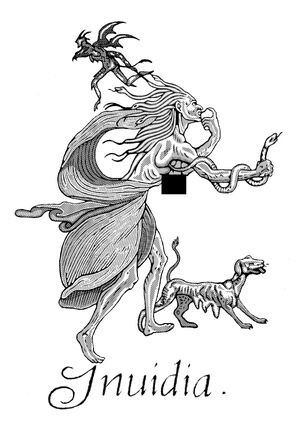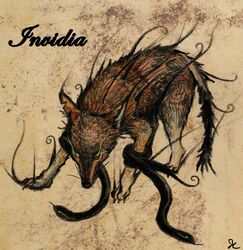No edit summary Tag: mobileedit |
m (→Trivia: Project Ark: Removing category from undetermined pages.) |
||
| (17 intermediate revisions by 8 users not shown) | |||
| Line 1: | Line 1: | ||
| + | {{Mature}}[[File:Invidia.jpg|thumb|300px|Invidia]] |
||
| ⚫ | |||
| ⚫ | {{Quote|Her face was sickly pale, her whole body lean and wasted, and she squinted horribly; her teeth were discoloured and decayed, her poisonous breast of a greenish hue, and her tongue dripped venom. … Gnawing at others, and being gnawed, she was herself her own torment.|Ovid (about Invidia) in ''Metamorphoses''.}} |
||
| ⚫ | '''Invidia''' is an ancient Roman Goddess of Envy who personified jealousy and hatred. Invidia according to Roman mythology, is pitied by the Roman deities who sees her as somewhat hideous and spiteful. She holds a great grudge against her kind and seeks to poison all creation with her taint of hate, one soul at a time. Her name, which is in Latin, is the origin and the sense of envy or jealousy, a "looking upon" associated with the evil eye, from ''invidere'', "to look against", "looking with malice" or "to look at in a hostile manner.". ''Invidia'' ("Envy") is one of the |
||
| + | |||
| ⚫ | '''Invidia''' is an ancient Roman Goddess of Envy who personified jealousy and hatred. Invidia according to Roman mythology, is pitied by the Roman deities who sees her as somewhat hideous and spiteful. She holds a great grudge against her kind and seeks to poison all creation with her taint of hate, one soul at a time. Her name, which is in Latin, is the origin and the sense of envy or jealousy, a "looking upon" associated with the [[w:c:evil:Evil|evil eye]], from ''invidere'', "to look against", "looking with malice" or "to look at in a hostile manner.". ''Invidia'' ("Envy") is one of the Seven Deadly Sins in Christian theology. |
||
==Personification== |
==Personification== |
||
| Line 8: | Line 10: | ||
==Gallery== |
==Gallery== |
||
<gallery widths="250"> |
<gallery widths="250"> |
||
| − | Invidia the Wolf.jpg |
+ | Invidia the Wolf.jpg|Invidia in her wolf form. |
| − | Invidia the Serpent.jpg |
+ | Invidia the Serpent.jpg|Invidia in her serpent form. |
| − | Invidia the Goddess of Envy.jpg |
+ | Invidia the Goddess of Envy.jpg|Invidia, the Goddess of Envy. |
| − | Goddess of Envy.jpg |
+ | Goddess of Envy.jpg|The goddess of envy. |
| − | The Goddess of Envy.jpg |
+ | The Goddess of Envy.jpg|The Goddess of Envy. |
</gallery> |
</gallery> |
||
| Line 21: | Line 23: | ||
*Invidia is the fatal flaw of Iago in [http://en.wikipedia.org/wiki/Othello Shakespeare's Othello]: "O you are well tuned now; but I'll set down the pegs that make this music." (''Othello'' II.i). |
*Invidia is the fatal flaw of Iago in [http://en.wikipedia.org/wiki/Othello Shakespeare's Othello]: "O you are well tuned now; but I'll set down the pegs that make this music." (''Othello'' II.i). |
||
*Invidia's name is also the Roman name for the ancient Greek goddess, Nemesis. |
*Invidia's name is also the Roman name for the ancient Greek goddess, Nemesis. |
||
| − | |||
[[Category:Deities]] |
[[Category:Deities]] |
||
| − | [[Category: |
+ | [[Category:Female]] |
| − | [[Category:Envious |
+ | [[Category:Envious]] |
| − | [[Category:Symbolic |
+ | [[Category:Symbolic]] |
[[Category:Mythology Villains]] |
[[Category:Mythology Villains]] |
||
| − | [[Category:Villains |
+ | [[Category:Villains of Folklore]] |
| − | [[Category: |
+ | [[Category:Mongers]] |
[[Category:Destroyers]] |
[[Category:Destroyers]] |
||
| ⚫ | |||
[[Category:Immortals]] |
[[Category:Immortals]] |
||
| − | [[Category:Shape-Shifters]] |
||
[[Category:Humanoid]] |
[[Category:Humanoid]] |
||
| − | [[Category: |
+ | [[Category:Animals]] |
| − | [[Category:Reptilian Villains]] |
||
| − | [[Category:Wolves]] |
||
| − | [[Category:Canine Villains]] |
||
| − | [[Category:Animal Villains]] |
||
[[Category:Dark Forms]] |
[[Category:Dark Forms]] |
||
[[Category:Corrupting Influence]] |
[[Category:Corrupting Influence]] |
||
| − | [[Category: |
+ | [[Category:Medusas/Gorgons]] |
| ⚫ | |||
Revision as of 22:58, 7 February 2020
| This article's content is marked as Mature The page contains mature content that may include coarse language, sexual references, and/or graphic violent images which may be disturbing to some. Mature pages are recommended for those who are 18 years of age and older. If you are 18 years or older or are comfortable with graphic material, you are free to view this page. Otherwise, you should close this page and view another page. |

Invidia
| “ | Her face was sickly pale, her whole body lean and wasted, and she squinted horribly; her teeth were discoloured and decayed, her poisonous breast of a greenish hue, and her tongue dripped venom. … Gnawing at others, and being gnawed, she was herself her own torment. | „ |
| ~ Ovid (about Invidia) in Metamorphoses. |
Invidia is an ancient Roman Goddess of Envy who personified jealousy and hatred. Invidia according to Roman mythology, is pitied by the Roman deities who sees her as somewhat hideous and spiteful. She holds a great grudge against her kind and seeks to poison all creation with her taint of hate, one soul at a time. Her name, which is in Latin, is the origin and the sense of envy or jealousy, a "looking upon" associated with the evil eye, from invidere, "to look against", "looking with malice" or "to look at in a hostile manner.". Invidia ("Envy") is one of the Seven Deadly Sins in Christian theology.
Personification
Invidia is a personification of envy, often envisioned as a woman, though it can also simply be used as a term for the emotion (without the personification aspect): in medieval times Invidia was considered one of the Seven Deadly Sins and was drawn as a woman with a serpent coiled round her breast and biting her heart, "to signify her self-devouring bitterness; she also raises one hand to her mouth to show she cares only for herself.".
Gallery
Trivia
- Invidia, or simply envy, is the uneasy emotion denied by the shepherd Melipoeus in Virgil's Eclogue 1.
- In Latin, invidia might be the equivalent of two Greek personifications, Nemesis and Phthonus. Invidia might be personified, for strictly literary purposes, as a goddess, a Roman equivalent to Nemesis in Greek mythology, though Nemesis did receive cultus, notably at her sanctuary at Rhamnous, north of Marathon, Greece.
- In the allegorical mythography of the Middle Ages and Renaissance, the 3 heads of the canine beast Cerberus sometimes represent three kinds of invidia.
- Invidia is the fatal flaw of Iago in Shakespeare's Othello: "O you are well tuned now; but I'll set down the pegs that make this music." (Othello II.i).
- Invidia's name is also the Roman name for the ancient Greek goddess, Nemesis.







